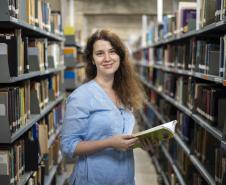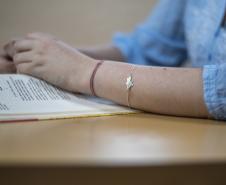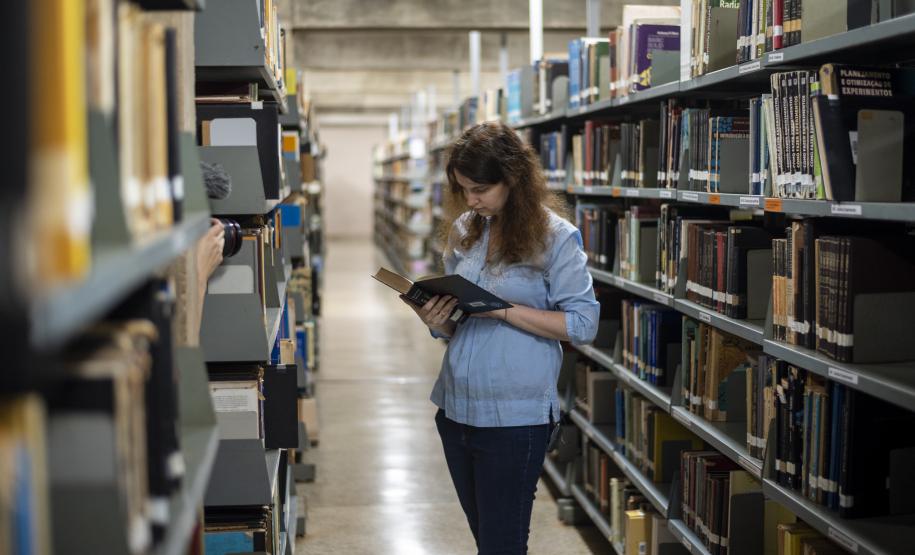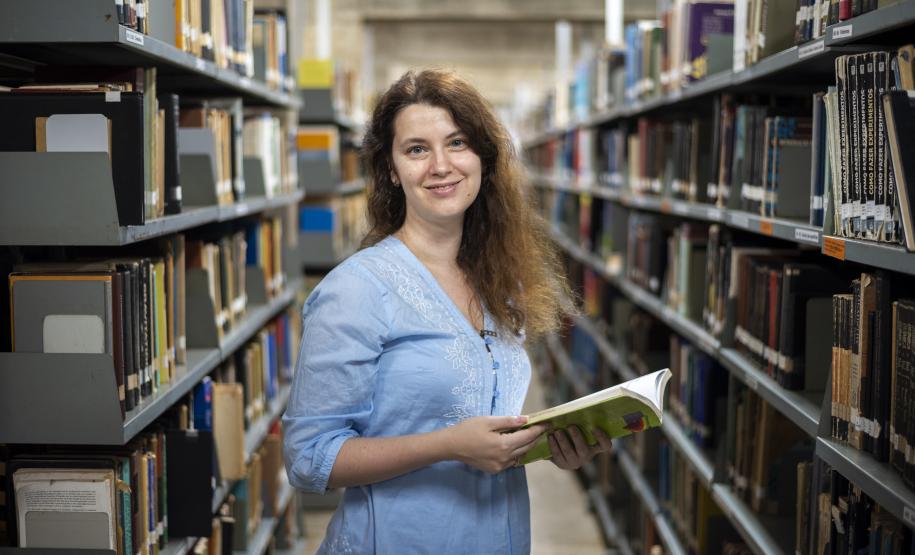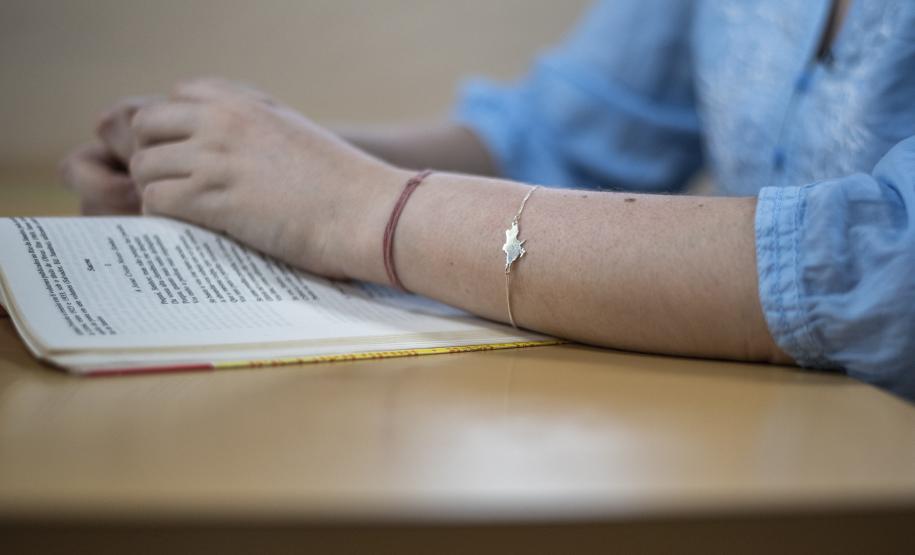Longe de casa, ucraniana ressalta a importância de falar sobre a Guerra 02/10/2023 - 02:16
No Paraná desde janeiro de 2023, Katherina Hodick leva um pedaço da Ucrânia por onde vai. A cada passo pela cidade e no campus da Universidade Estadual de Londrina (UEL), a pesquisadora olha para o futuro, sempre com a memória viva do que deixou para trás no além mar. Ao relembrar o que viveu antes de sair de Kiev e traçar planos no Brasil, ela carrega o lema: é preciso falar sobre a Guerra.
“Eu desejo que vocês nunca saibam o quanto é difícil. É meu maior desejo, que isso acabe e nunca mais aconteça, em qualquer país”. Enquanto Katherina expressava esse sentimento, manuseava uma pulseira com o mapa da Ucrânia, no braço esquerdo. Ela conhece cada pedaço do país – apontou onde fica a Crimeia, primeiro espaço de disputa russo; Odessa; Mar Negro; e Chernobyl. “Temos linha de frente aqui, essa parte longa [...] e este é o lugar mais perigoso, esta parte [...], acreditamos que é um lugar seguro, mas às vezes, os foguetes caem aqui”, dizia enquanto apontava para a região onde fica Kiev.
Bastou se sentar na Biblioteca da UEL para que as lembranças viessem de pronto. Katherina lembra dos pais e do marido, que ainda estão na capital ucraniana. “Meu marido não pode deixar a Ucrânia, ele não é autorizado porque ele é homem e ele pode ingressar no exército a qualquer momento”, conta. Quando surgiu a oportunidade de participar do Programa de Acolhida a Cientistas Ucranianos, da Fundação Araucária, foi o momento de pensar: talvez ela nunca mais os veria. “Viver na Ucrânia faz você perceber que a morte não é algo especial. E eu pensei que, talvez, eu não os veria novamente, mas me dei conta que seria um grande desafio para mim, como pesquisadora [vir ao Brasil]”, descreve.
Katherina é professora da Academia Júnior de Ciências da Ucrânia, onde atua no desenvolvimento de materiais pedagógicos direcionados a crianças que participam de competições intelectuais. Na UEL, a pesquisadora trabalha no Programa de Pós-Graduação em Letras. Quando ainda estava em Kiev, os apagões eram frequentes, o que fez com que ela e demais colegas tivessem que lecionar nas estações de metrô, onde há luz e é seguro. “Se estiver em Kiev e quiser sobreviver durante uma guerra nuclear, você deve ir para a estação Arsenal, a mais profunda da Europa”, adverte.
Desde que chegou em Londrina, a pesquisadora diz pensar na Guerra todos os dias. “Uma pessoa me perguntou por que deveríamos falar sobre a guerra. Eu tinha uma boa resposta: a guerra pode acontecer no seu país também, e eu gostaria que acabasse, não apenas na Ucrânia, mas também em outros países”.
Para Katherina
Mesmo com a separação geográfica, há lugares em que as línguas russa e ucraniana convivem, especialmente na parte oriental do país. O conflito aflora sentimentos que existem desde a União Soviética. “É o estilo de vida. Fala-se ucraniano, isso significa que não se é suficientemente bom, porque na propaganda russa dizem que os ucranianos são outro povo”, conta.
A disputa é também pela cultura. “Acham que somos muito estúpidos ou muito primitivos e nos chamam de ‘pessoas da vila’. Mas, na cultura ucraniana, a vila é o centro da cultura e não é primitiva”. A cultura da vila, como conta Katherina, é viver em comunidade, como casar-se em Outubro, depois do inverno, quando as famílias têm provisões financeiras. “É preciso chamar toda a gente, porque é uma festa de três ou sete dias".
O sentimento de pertencimento fez com que o marido permanecesse na Ucrânia de forma mais tranquila. “Ele acredita que nada acontecerá com ele. Mas minha saúde mental não é tão boa, porque é um tanto estressante quando você acorda ouvindo explosões em algum lugar, talvez próximo à sua casa”.
O fato de nunca saber quando e onde a próxima bomba cairia na cidade causava muito medo em Katherina. “Você deve pegar seu telefone e ligar para sua mãe e seu pai, e para seu marido, para alguém checar se está tudo bem”. O barulho de uma bomba se assemelha ao escape de motocicletas ou cortadores de grama, para ela. “Após esse trauma, às vezes quando eu escuto isso, eu olho ao redor apenas para checar onde estou”.
A Guerra não atinge apenas humanos. Assim como no Brasil, ucranianos também cuidam dos seus animais de estimação. “Um dia, a Guerra chega em sua cidade e você tem cinco a quinze minutos para escapar”. Na maioria das vezes, não há tempo de encontrar seu pet. “Eles não conseguem sobreviver na natureza, porque eles são pets. Eles não sabem como encontrar comida, eles têm baixa imunidade, eles podem morrer por um vírus”, lamenta.
Para ajudar os animais da Ucrânia, Katherina apoia o Zoopatrul, grupo que resgata animais afetados pelo conflito. “Em março, eles visitaram um vilarejo, onde não havia pessoas, porque todos foram evacuados, e eles resgataram alguns animais. Eles têm abrigo, clínica e tentam encontrar novos donos”.
Mesmo comprometida com a pesquisa no Brasil, ela tenta lidar com o estresse que a Guerra deixou. “Só agora consigo dormir bem. Por causa dos problemas na Ucrânia, parei de dormir a noite toda. Porque também faz parte do trauma e não é um problema especificamente meu, é um problema de todas as mulheres e homens ucranianos”. Quando se acorda ouvindo uma explosão, é difícil adormecer mais uma vez. “No seu cérebro você entende que está longe de casa, está seguro, está tudo bem, mas para o seu corpo são os sons altos”, descreve.
Novas formas de trabalhar
“Quando eu cheguei em Londrina eu não sabia nada, não falava bem português”, conta. Apesar de ter conversado com o seu orientador quando ainda estava na Ucrânia, a linguagem ainda era um obstáculo quando desembarcou na cidade. Em pouco mais de nove meses, a pesquisadora já conversa e compreende bem a língua portuguesa. “Sou filóloga [pesquisadora de linguagem] e para os filólogos não é muito difícil aprender a língua, apenas uma questão de tempo”, ri.
O idioma não foi a única barreira que atravessou – questões de relacionamento pessoal foram também uma nova aventura. “Eu fui ao carnaval aqui em Londrina, junto com o meu orientador e sua família, e na Ucrânia isso é totalmente impensável, porque não é bem visto”, descreve.
A relação com seu orientador, o professor do Departamento de Letras Vernáculas e Clássicas da UEL, Frederico Garcia Fernandes, é como de pai e filha. "Katherina é uma jovem pesquisadora muito amigável e extremamente interessada na cultura brasileira. Assim que chegou no país, nós a acolhemos em nossa casa, que foi sua primeira moradia", conta Frederico.
Quando chegou a hora de alugar uma moradia, o professor alugou o apartamento que pertence à sua sogra para a pesquisadora. "Katia, como a chamamos, é hoje em dia parte de nossa família. Sua afinidade com minha esposa foi tão grande, que ela chegou a afirmar que só entendia português quando falava com ela".
A dupla conversa na maior parte do tempo em inglês. "Mas de uns meses para cá a evolução de seu português tem sido impressionante, graças à sua enorme dedicação e estudos. Agora misturamos um pouco de inglês e português", descreve.
A convivência com ela é um privilégio para o professor. "Katia transformou-se como pesquisadora no Brasil. Ganhou maturidade e segurança. Acredito que no futuro será uma grande referência sobre cultura brasileira na Ucrânia", completa.
Próximos passos
Neste semestre, Katherina pretende iniciar um curso de literatura ucraniana na UEL. “O nome é Retratos da Resistência, uma breve história da literatura ucraniana”, conta.
A pesquisa na UEL será desenvolvida na área de Teoria Literária, para efetivar uma aproximação cultural entre escritores ucranianos e brasileiros. "Num primeiro momento, estamos preparando uma antologia de poetas ucranianos contemporâneos para serem traduzidos para o português", descreve o orientador. Depois, a pesquisadora fará uma seleção de brasileiros para serem traduzidos para o ucraniano, com uma reflexão sobre coletivos poéticos e seu papel diante da Guerra.
Com tantas novidades e trabalho intenso, apesar de estar longe da terra-mãe, ela entende a importância de se viver em comunidade e pensar no futuro. “Eu espero pelo final da Guerra. Eu acho que… Nós vamos vencer. Nós vamos vencer essa guerra”. O resultado não é questão de tempo, mas de preço para ela. “Quantas pessoas vão morrer? Muitas vilas e cidades vão ser destruídas. A questão é quanto isso vai custar?”.
-------------------------------------------------------------------------------------------------------------------------------------------------------------------------------------------------------------------------------------
Far from home, Ukrainian scientist emphasizes the importance of talking about the war
In Paraná since January 2023, Katherina Hodick takes a piece of Ukraine with her wherever she goes. With every step she takes in the city and on the campus of the State University of Londrina (UEL), the researcher looks to the future, always with a vivid memory of what she left behind on the other side of the sea. As she recalls what she experienced before leaving Kiev and making plans in Brazil, she carries the motto: we need to talk about the war.
"I wish you would never know how difficult it is. It's my greatest wish that it would end and never happen again, in any country". As Katherina expressed this sentiment, she held a bracelet with a map of Ukraine on her left arm. She knows every part of the country - she pointed out Crimea, Russia's first disputed area; Odessa; the Black Sea; and Chernobyl. "We have a front line here, this long part [...] and this is the most dangerous place, this part [...], we believe it's a safe place, but sometimes rockets fall here", she said as she pointed to the region where Kiev is.
It was enough to sit down in the UEL Library for the memories to come flooding back. Katherina remembers her parents and her husband, who are still in the Ukrainian capital. "My husband can't leave Ukraine, he's not allowed because he's a man and he can join the army at any time", she says. When the opportunity arose to take part in the Araucária Foundation's Program for Welcoming Ukrainian Scientists, it was the moment to think: perhaps she would never see them again. "Living in Ukraine makes you realize that death is not something special. And I thought that maybe I wouldn't see them again, but I realized that it would be a great challenge for me as a researcher [to come to Brazil]", she describes.
Katherina is a professor at the Ukrainian Junior Academy of Sciences, where she works on developing teaching materials for children taking part in intellectual competitions. At UEL, she works in the Postgraduate Program in Literature. When she was still in Kiev, blackouts were frequent, which meant that she and other colleagues had to teach in metro stations, where there is light and it is safe. "If you're in Kiev and want to survive during a nuclear war, you should go to Arsenal station, the deepest in Europe", she warns.
Since arriving in Londrina, the researcher says she thinks about the war every day. "Someone asked me why we should talk about the war. I had a good answer: war can happen in your country too, and I'd like it to end, not just in Ukraine, but in other countries too".
For Katherina
Even with the geographical separation, there are places where the Russian and Ukrainian languages coexist, especially in the eastern part of the country. The conflict stirs up feelings that have existed since the Soviet Union. "It's the way of life. If you speak Ukrainian, that means you're not good enough, because Russian propaganda says that Ukrainians are another people", she says.
The dispute is also about culture. "They think we're too stupid or too primitive and call us 'village people'. But in Ukrainian culture, the village is the center of culture and is not primitive." Village culture, as Katherina tells us, is about living in community, like getting married in October, after the winter, when families have financial provisions. "You have to call everyone together, because it's a three or seven-day festival".
The feeling of belonging has made her husband stay in Ukraine more peacefully. "He believes that nothing will happen to him. But my mental health is not so good, because it's a bit stressful when you wake up hearing explosions somewhere, maybe near your house".
The fact that she would never know when and where the next bomb would fall on the city caused Katherina a great deal of fear. "You should pick up your phone and call your mother and father, and your husband, so that someone can check if everything is okay". The sound of a bomb resembles motorcycle exhaust or lawnmowers for her. "After this trauma, sometimes when I hear it, I look around just to check where I am".
War doesn't just affect humans. Just like in Brazil, Ukrainians also take care of their pets. "One day, war comes to your town and you have five to fifteen minutes to escape”. Most of the time, there's no time to find your pet. "They can't survive in the wild, because they're pets. They don't know how to find food, they have low immunity, they can die from a virus", she laments.
To help animals in Ukraine, Katherina supports Zoopatrul, a group that rescues animals affected by the conflict. "In March, they visited a village where there were no people, because everyone had been evacuated, and they rescued some animals. They have a shelter, a clinic and are trying to find new owners".
Even though she's committed to her research in Brazil, she's trying to cope with the stress that the war has left behind: "Only now I can sleep well. Because of the problems in Ukraine, I stopped sleeping through the night. Because it's also part of the trauma and it's not just my problem, it's a problem for all Ukrainian women and men". When you wake up hearing an explosion, it's hard to fall asleep again. "In your brain you understand that you're far from home, you're safe, everything is fine, but for your body it's the loud sounds", she describes.
New ways of working
"When I arrived in Londrina I didn't know anything, I didn't speak Portuguese well", she says. Although she had talked to her advisor when she was still in Ukraine, language was still an obstacle when she arrived in the city. In just over nine months, the researcher already speaks and understands Portuguese well. "I'm a philologist [language researcher] and for philologists it's not very difficult to learn the language, it's just a matter of time", she laughs.
Language wasn't the only barrier she crossed - personal relationship issues were also a new adventure. "I went to the carnival here in Londrina, together with my advisor and his family, and in Ukraine that's totally unthinkable, because it's not well regarded," she describes.
The relationship with her advisor, Frederico Garcia Fernandes, a professor in the Department of Vernacular and Classical Letters at UEL, is like that of father and daughter. "Katherina is a very friendly young researcher and extremely interested in Brazilian culture. As soon as she arrived in the country, we welcomed her into our house, which was her first home," says Frederico.
When the time came to rent a place, the professor rented the apartment that belongs to his mother-in-law for the researcher. "Katia, as we call her, is now part of our family. Her affinity with my wife was so great that she even said that she only understood Portuguese when she spoke to her".
The pair talk mostly in English. "But over the last few months, the evolution of her Portuguese has been impressive, thanks to her enormous dedication and studies. Now we mix a bit of English and Portuguese", he describes.
Living with her is a privilege for the professor. "Katia has transformed herself as a researcher in Brazil. She has gained maturity and confidence. I believe that in the future she will be a great reference on Brazilian culture in Ukraine", he adds.
Next steps
This semester, Katherina plans to start a course on Ukrainian literature at UEL. "The name is Portraits of Resistance, a brief history of Ukrainian literature", she says.
The research at UEL will be developed in the area of Literary Theory, to bring about a cultural rapprochement between Ukrainian and Brazilian writers. "At first, we are preparing an anthology of contemporary Ukrainian poets to be translated into Portuguese," says the supervisor. Afterwards, the researcher will make a selection of Brazilian poets to be translated into Ukrainian, with a reflection on poetic collectives and their role in the face of war.
With so much news and intense work, despite being far from her motherland, she understands the importance of living in a community and thinking about the future. "I hope for the end of the war. I think... We're going to win. We're going to win this war". The outcome is not a question of time, but of price for her. "How many people will die? Many towns and cities will be destroyed. The question is how much will it cost?".
Texto: Jéssica Natal - UEPG.
Fotos: Henry Milléo.




